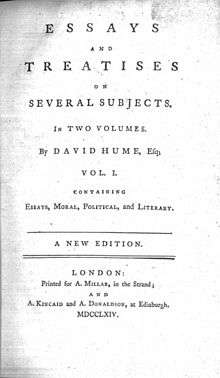Of the Balance of Trade
On the Balance of Trade is an economic text on monetary economics, written by David Hume and published in 1752. In this book, Hume examines various mistakes committed by nations regarding trade, and suggests better alternatives. The thought experiments Hume uses in the book are sometimes argued by modern economists to be the first formal economic models.
 | |
| Author | David Hume |
|---|---|
| Country | Scotland |
| Language | English |
| Genre | Economics, Philosophy |
Publication date | 1752 |
Argument
Hume starts out with an important point that touches upon a key fact of economics that many fail to recognize even in the 21st century: Allowing the sale or export of a good actually increases its production. Economic activity in trade is not a fixed-slice pie, but one where freedom to trade can create more, rather than less.
It is very usual, in nations ignorant of the nature of commerce, to prohibit the exportation of commodities, and to preserve among themselves whatever they think valuable and useful. They do not consider, that, in this prohibition, they act directly contrary to their intention; and that the more is exported of any commodity, the more will be raised at home, of which they themselves will always have the first offer.[1]
He uses, as example, the ridiculous (his word) behavior of the ancient Athenian government, in banning the export of a certain kind of fig deemed too delicious for mere foreigners...but he goes on to cite similar errors in contemporary England and France, as well.
In modern economic terms, this is equilibration through the price-specie flow mechanism. In other words, money moves around where it's needed, forever seeking a balance.
This means that not only does a country not need to limit exports, but also need not limit imports, because the money flowing out of the economy will create more demand for money, helping bring it back in.[2]
Impact
Hume's essay is the first known establishment of the concept of the Price-Specie Flow Mechanism, and perhaps still the best,[3] cited by Paul Krugman and John Maynard Keynes on one end of the political spectrum, and Austrian economists on the other.
References
- Of the Balance of Trade
- Murray N. Rothbard, David Hume and the Theory of Money", Mises Daily Articles, 27 April 2011.
- Robert W. McGee (1989). "The Economic Thought of David Hume" (PDF). Hume Studies. 15 (1): 184–204.